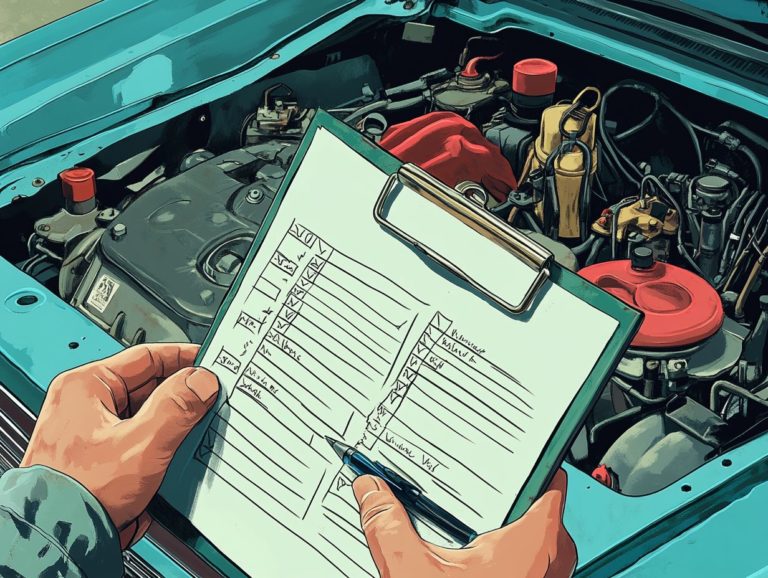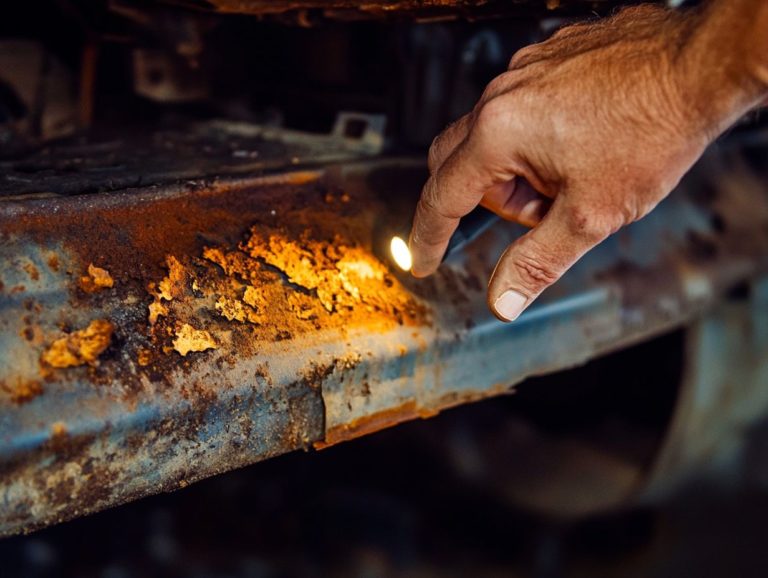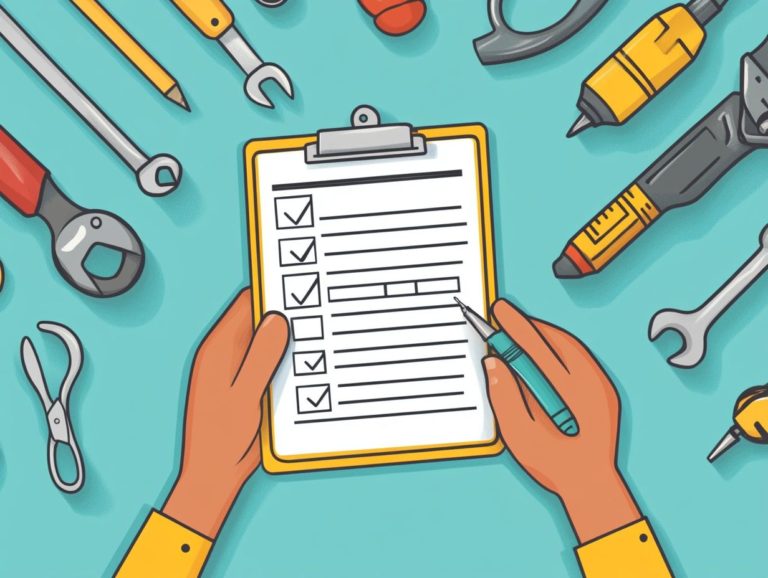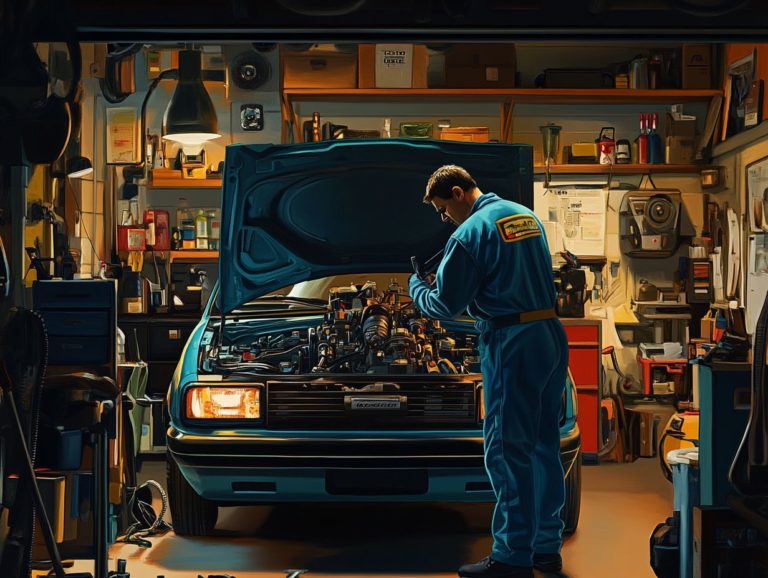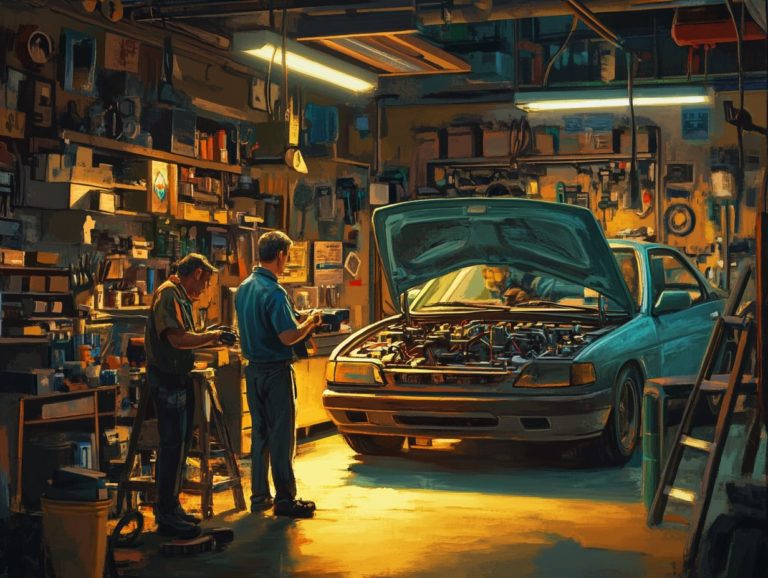How to Prepare for a Car Inspection Appointment
Car inspections are essential for ensuring your vehicle’s safety and adherence to regulations. Let s dive in and keep your car running smoothly!
This guide provides a comprehensive overview, covering everything you need to know from what a car inspection involves to how to prepare for your appointment. You will discover the significance of inspections, what to expect during the process, and how to interpret the results effectively.
You will also find valuable tips on maintaining your vehicle, making it easier to pass future inspections.
Contents
Key Takeaways:
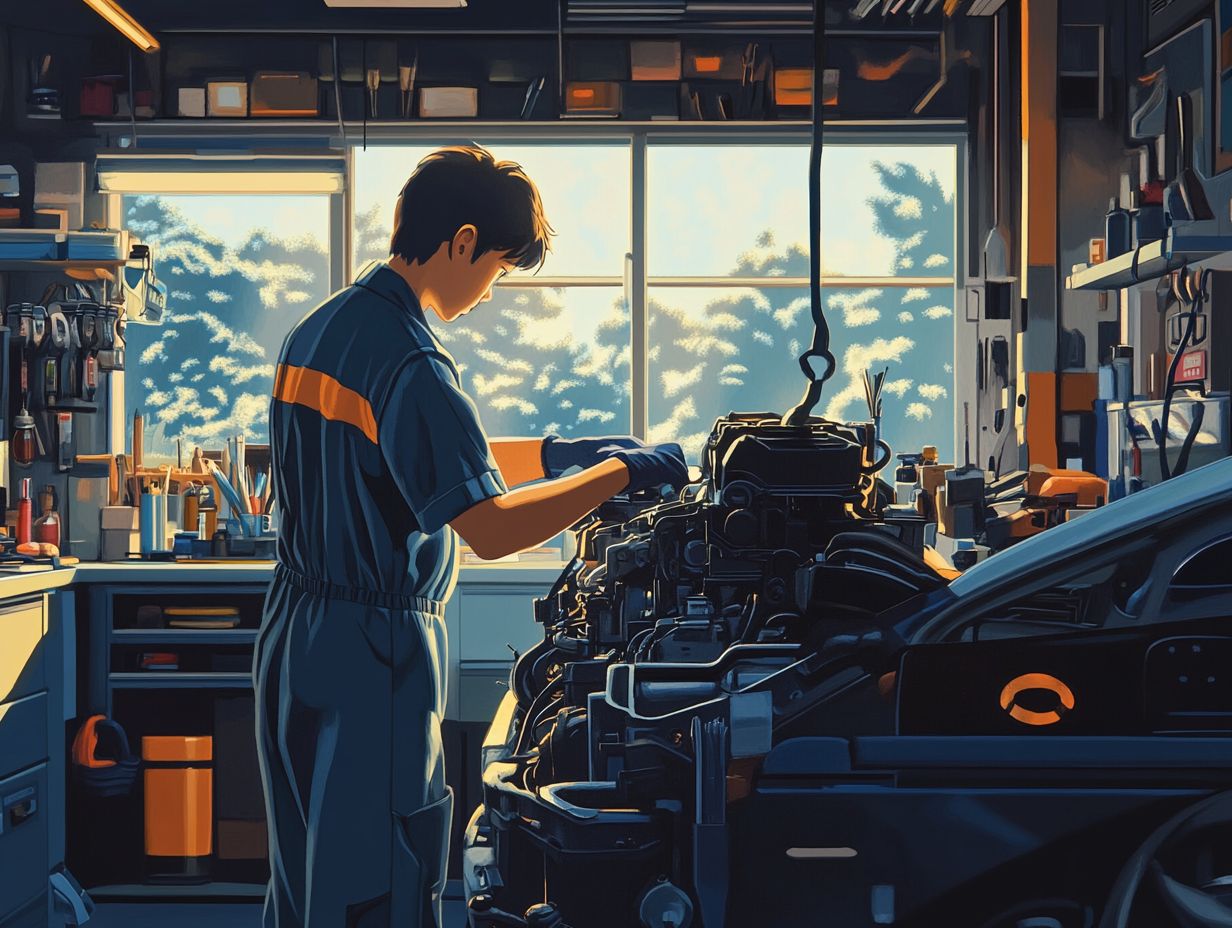
- Gather necessary documents and address any known issues before the inspection.
- Understand the inspection process and common areas of focus to know what to expect during the appointment.
- Regularly maintain and check your car to ensure it passes future inspections.
Understanding Car Inspections
Every vehicle owner needs to understand car inspections. In New Jersey, state regulations require regular checks to keep roads safe.
During a typical vehicle inspection, various checks take place, including lights, tire conditions, seat belts, and overall safety features.
These inspections aren’t just a box to tick for valid vehicle registration and insurance; they also help identify potential repair issues before they become costly problems.
By sticking to a maintenance schedule and staying on top of required inspections, you can ensure your vehicle’s longevity and optimal performance.
What is a Car Inspection?
A car inspection is a careful check of your vehicle s vital components to ensure it meets safety and environmental standards set by local regulations.
This process includes safety evaluations focusing on critical areas like brakes, lights, and tires, along with emissions tests that check how much pollution your car produces.
An inspection usually involves a comprehensive checklist that covers many criteria, ensuring every part of your vehicle is thoroughly examined.
At designated inspection stations, experienced technicians confirm compliance with these criteria and offer valuable insights about maintenance needs and potential repairs, helping to ensure your vehicle is truly road-ready.
Why is it Important?
Car inspections are essential for maintaining your vehicle’s safety and ensuring you meet insurance registration requirements, ultimately protecting both you and other road users.
Regular inspections help catch potential issues before they escalate, significantly reducing the risk of accidents due to mechanical failures. These checks also provide vital documentation that is invaluable during an insurance claim.
If your vehicle hasn t had recent inspections, you may face increased liability, as it could be considered unsafe for the road. Ignoring inspection standards can lead to higher repair costs later on, as minor problems that could have been addressed early transform into major headaches, placing a heavier financial burden on you as the vehicle owner.
Preparing for a Car Inspection Appointment
Preparing for your car inspection appointment means gathering all the necessary documents and addressing any known issues in advance. To ensure a smooth process, familiarize yourself with the best practices for a car inspection.
This proactive approach can significantly streamline the inspection process and help you avoid potential failures.
Gather Necessary Documents and Information
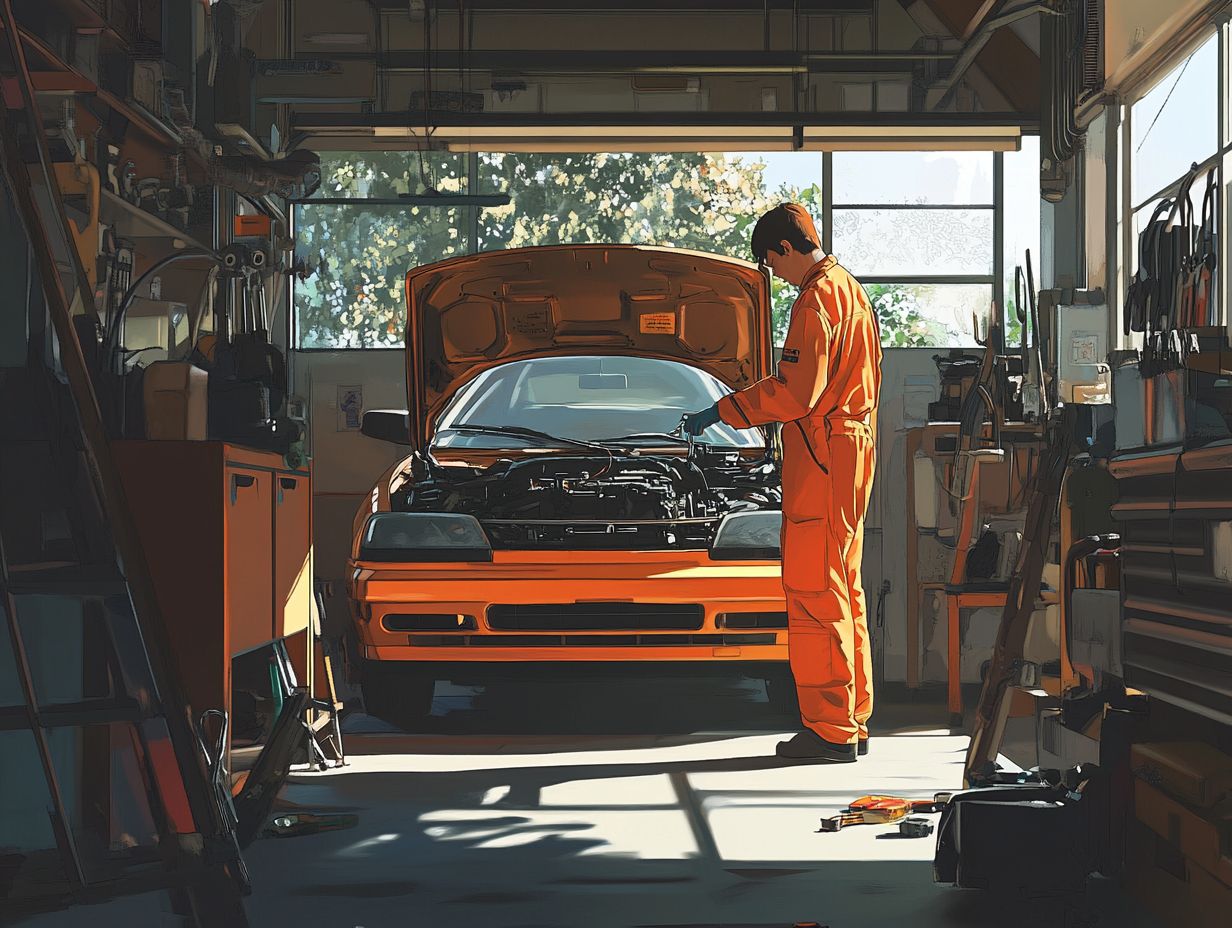
To ensure a seamless car inspection experience, gather all your valid documents, including your driver’s license, vehicle registration, and any previous inspection stickers. Additionally, knowing how to prepare for a used car purchase can help streamline the process and avoid unnecessary delays during your appointment.
It s wise to keep a detailed log of your vehicle s service history, noting the dates and types of maintenance performed. This can be incredibly beneficial. Maintaining a dedicated folder for all registration records will also help you keep track of renewal dates and necessary paperwork.
Using apps or setting reminders can help you stay organized and ensure you meet all requirements, making the inspection process as efficient as possible.
Check and Address Any Known Issues
Make sure to tackle any known issues to breeze through your inspection! Take a moment to assess your tires, ensure your lights are functional, and verify the integrity of your windshield. For a detailed approach, refer to the step-by-step guide to inspecting a car.
This quick pre-inspection check can save you time and money don t miss it!
Begin by examining the tire tread depth and making sure the tire pressure is within the recommended range. Next, check that all your headlights, brake lights, and turn signals are working so others can see your vehicle clearly on the road.
Inspect your windshield wipers for wear and test the fluid levels to ensure optimal visibility. By focusing on these key components, you ll maintain your vehicle’s safety and reliability, setting yourself up for a smooth inspection experience.
What to Expect During the Inspection
During a car inspection, expect a meticulous evaluation of your vehicle’s essential systems. This includes a test to check how much pollution your car produces, a comprehensive brake inspection, and various safety checks to ensure your vehicle meets the necessary standards.
The Inspection Process
The inspection process typically involves a series of checks carried out by trained technicians at designated facilities or repair shops. They ensure that your vehicle meets established safety and performance criteria.
Experts methodically assess various components such as brakes, lights, tires, and emissions systems. Each vehicle undergoes both a visual and practical evaluation, culminating in a detailed report that outlines any issues discovered.
Depending on the inspection service you choose whether it s a pre-purchase assessment or a routine safety check different levels of scrutiny may be applied. After the inspection, the findings often reveal if automotive repairs are necessary to enhance safety or comply with legal requirements.
These results allow you to address any concerns and make informed decisions about the necessary repairs for optimal performance.
Common Areas of Focus
For vehicle inspections, focus on key safety points, such as seat belts, steering alignment, and the overall array of safety features your vehicle offers. Don t stop there; critical systems like the braking system, lights, and tires require just as much attention to ensure peak performance and safety.
Worn tires can drastically reduce traction and stability, elevating the risk of accidents. If your brakes are malfunctioning, you’re jeopardizing your ability to stop when it counts the most.
Ensuring that all lights are functioning headlights, turn signals, and more is absolutely essential for visibility and clear communication with other road users. Overlooking these inspection areas could lead to serious consequences, putting both you and others on the road in peril.
After the Inspection

After the inspection, it’s crucial for vehicle owners to understand the results, especially if any issues were pinpointed or if the inspection revealed a failure that demands immediate attention.
Understanding these details can help ensure the safety and reliability of your vehicle.
Understanding the Results
Understanding the results of your vehicle inspection is essential. It lays bare any failures that may point to significant maintenance issues needing your immediate attention.
These outcomes reflect not just the current state of your vehicle but also offer a crucial roadmap for prioritizing necessary actions. A pass indicates everything is functioning smoothly, while a fail can reveal areas that could pose safety concerns if left unattended.
Don t ignore repair recommendations they’re essential for your safety! Taking action ensures you fix any problems quickly and promotes the longevity of your vehicle, as well as the safety of everyone on the road.
Addressing Any Failed Inspections
Addressing failed inspections promptly is crucial for you as a vehicle owner. Unresolved issues can pose safety risks and potentially violate inspection requirements in New Jersey.
To navigate this situation effectively, find a reputable repair shop with a proven track record in handling inspection failures. Look for establishments well-versed in state regulations and employ certified technicians.
Once you receive a comprehensive diagnosis of the issues, ensure all necessary repairs are completed and verified through follow-up inspections. This will provide you with the peace of mind you deserve.
Taking action not only enhances your vehicle’s safety but also helps you meet the requirements for inspections, ultimately saving you time and money in the long run.
Tips for Maintaining a Passed Inspection
To ensure your vehicle passes inspections effortlessly, adhere to a regular maintenance schedule. Additionally, consider implementing a comprehensive protection plan that includes routine checks for all essential components.
This approach safeguards your vehicle s performance and enhances its longevity.
Regular Maintenance and Check-Ups
Regular maintenance and check-ups, including timely oil changes and inspections, are essential for keeping your vehicle in peak condition. They ensure your vehicle sails through future inspections.
Neglecting these tasks can lead to bigger, more expensive problems, affecting your vehicle’s performance, safety, and efficiency.
Simple routine tasks, like checking tire pressure and replacing air filters, are key to enhancing your vehicle’s longevity.
By following a structured maintenance schedule, you can maintain the reliability of your transportation and significantly boost your chances of passing mandatory inspections without a hitch.
This approach fosters peace of mind and allows you to focus on the road ahead, knowing you’ve taken the crucial steps to care for your vehicle.
Preparing for Future Inspections
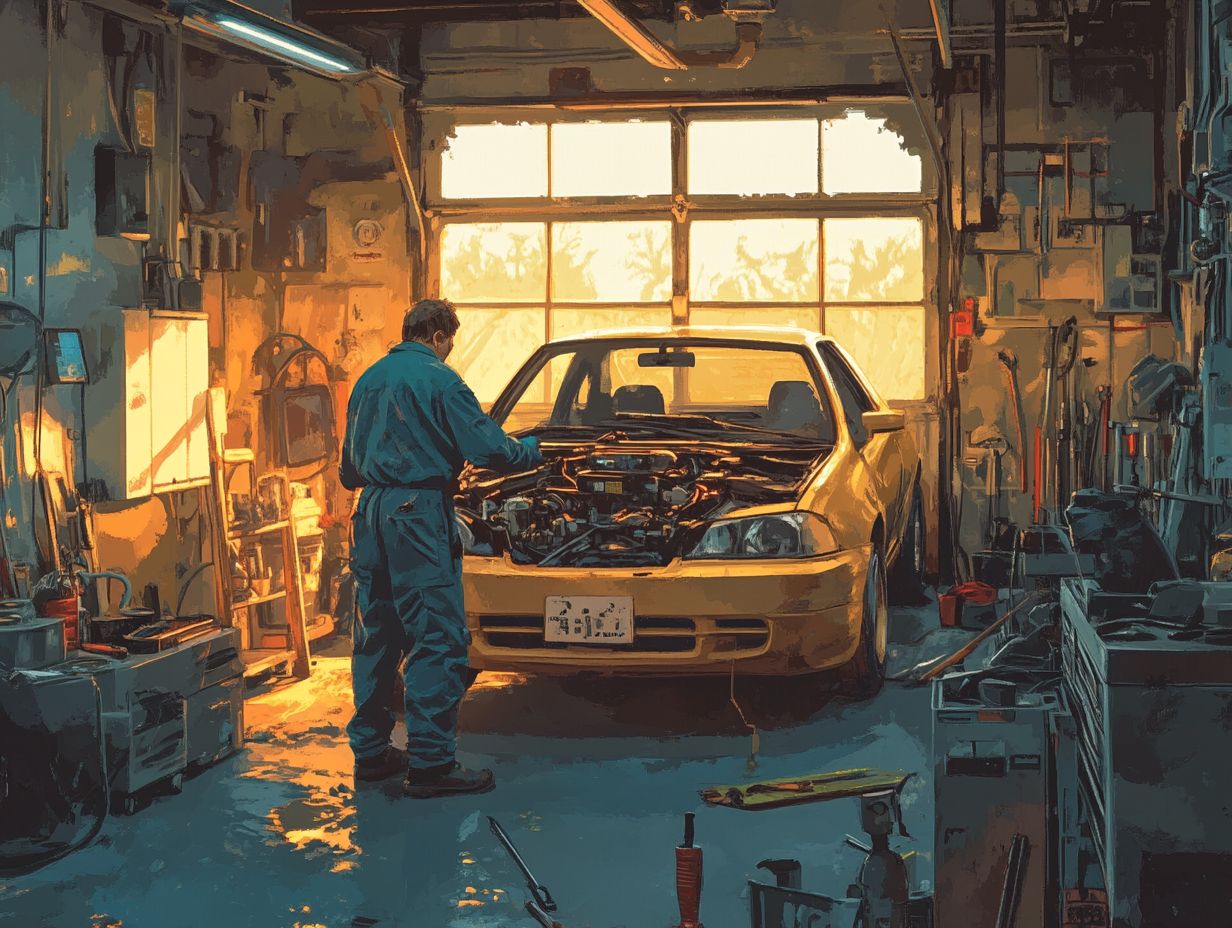
Preparing for future inspections entails more than keeping up with scheduled maintenance; it also means ensuring your vehicle registration is current to avoid any issues related to expired registration.
Besides monitoring your registration, gather and organize essential documents, such as your insurance papers and any previous inspection reports. This will streamline the process significantly.
Plan ahead by scheduling inspections well in advance to relieve last-minute stress. Efficiently utilize inspection facilities by knowing their operating hours and requirements to minimize your wait times.
By maintaining a checklist of all necessary items and staying proactive about deadlines, you ll ensure a smoother experience when the time arrives for your next inspection.
Frequently Asked Questions
What should I bring to my car inspection appointment?
- Your car’s registration
- Insurance documents
- Any maintenance records
- Your driver’s license
- Payment for the inspection fee
How can I ensure my car passes the inspection?
To ensure your car passes the inspection, make sure it is in good working condition. Check the tires, brakes, lights, and signals beforehand. For a comprehensive overview, refer to understanding the car inspection process. If there are any issues, get them fixed before the appointment.
Do I need to clean my car before the inspection?
While not mandatory, cleaning your car is a good idea. A tidy interior and exterior help the inspector check your car’s condition easily, and it can also support your case if you follow tips for a successful car inspection negotiation.
Can I reschedule or cancel my car inspection appointment?
Yes, you can usually reschedule or cancel. Just remember, there might be a cancellation fee, so check with the inspection center first.
What if my car fails the inspection?
If your car fails, the inspector will give you a list of repairs needed and a deadline to complete them.
Once you ve fixed the issues, you can schedule a follow-up inspection to get your car back on the road.
How long does a car inspection appointment typically take?
The length of a car inspection varies by location and vehicle condition. Typically, expect it to take about 30 minutes to an hour.

